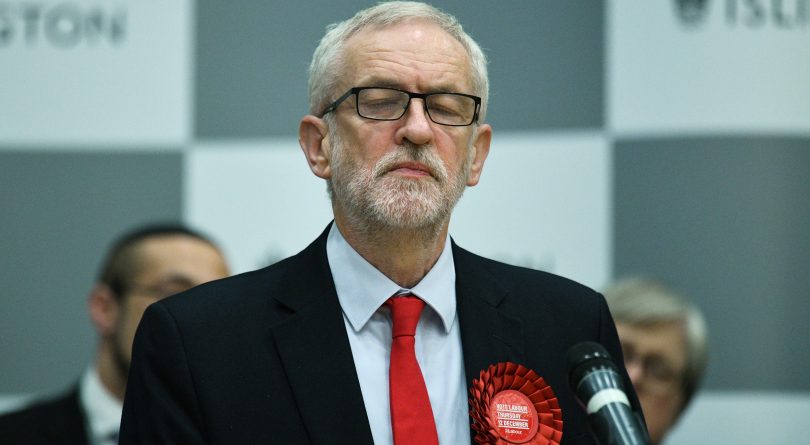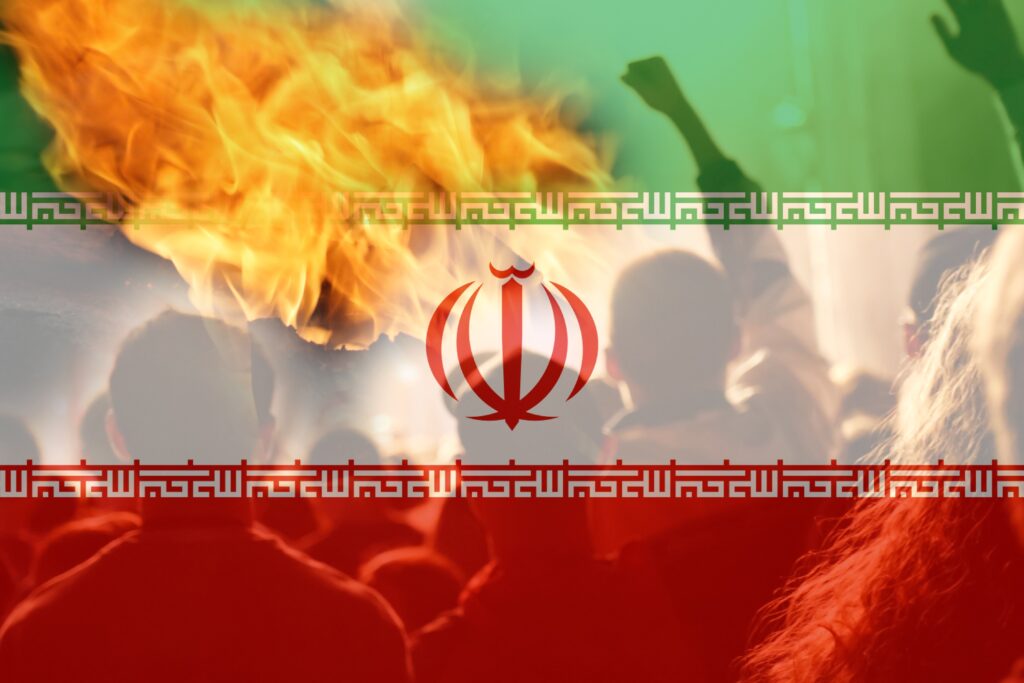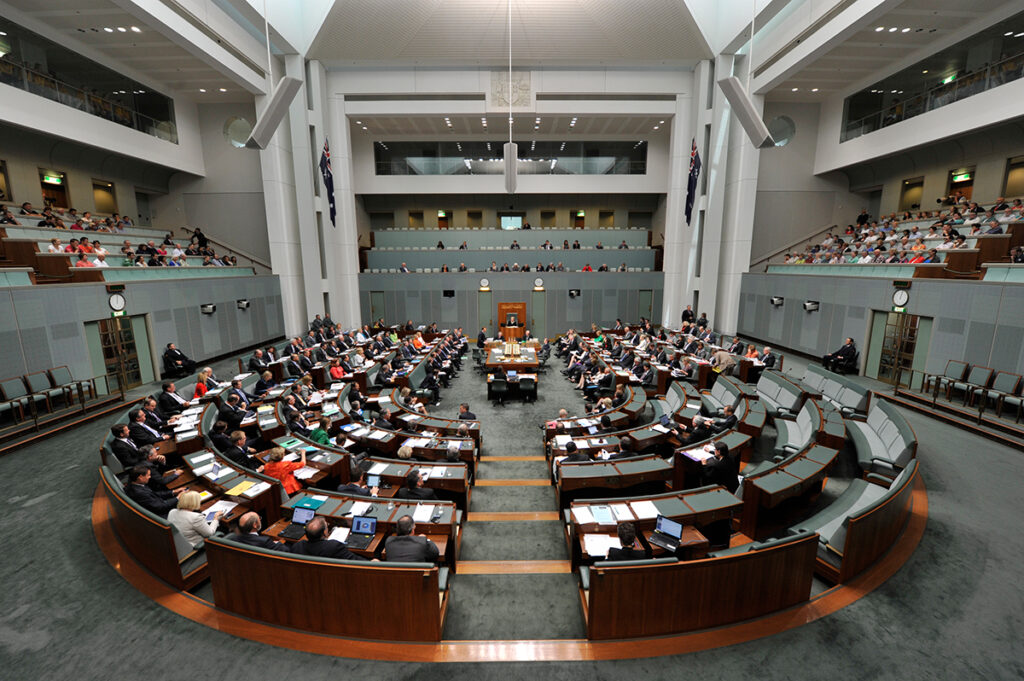UPDATES
New developments in Europe, Israel and Persian Gulf
December 18, 2019 | AIJAC staff

Update from AIJAC
12/19 #02
This Update takes readers around the world, to the UK, Israel and Iran, catching up on recent news and developments on three different news fronts: the British elections; the dissolution of the 22nd Knesset, putting Israel on the road to a third election in a year; while China is preparing to participate in joint military exercises with Iran and Russia.
In Great Britain, the Labour party under Jeremy Corbyn has suffered its worst electoral defeat in decades, while the Conservatives made history, receiving swings of 10-15% from the main opposition across swathes of constituencies after nine years in power. Labour’s Columnist Zoe Strimpel from the UK’s Telegraph writes that while the reasons for Corbyn’s thumping were many, his failure to take strong enough steps to root out antisemitism within the party ranks among them. The stage, she says, is set for Jews to be blamed for Labour’s poor showing, and in fact, judging by post-election comments by former London mayor Ken Livingstone and social media posts by Labour activists, it has already begun. For more by Strimpel, CLICK HERE.
Meanwhile, in Israel, Times of Israel editor David Horovitz takes issue with the assumption among Israelis that a third election within a year, scheduled for March 2, is entirely bad news for the country. While acknowledging the immense cost the country is shouldering for the political paralysis and unnecessary elections, Horovitz notes that the first two elections took place under the backdrop of uncertainty about the future of Prime Minister Binyamin Netanyahu’s corruption cases that added to voter confusion. Following the decision of Attorney General Avichai Mandelbit to indict Netanyahu, Horovitz writes, the upcoming election will be held with voters “better equipped to make an informed decision” about who should lead the country, which may lead to a more decisive result. For more on Horovitz’ reasoning, CLICK HERE.
Finally, writing for the Asia-Pacific current affairs website The Diplomat, Lucille Greer, a Schwarzman Fellow at the Wilson Center’s Kissinger Institute on China and the United States, looks at the implications of China joining Iran and Russia in joint naval exercises starting on December 27. Greer writes that, while Iran clearly needs the military cooperation more than China does, it does give China an opportunity to increase its influence in the Middle East, something which is becoming increasingly important on China’s foreign agenda as further evidenced by news reports that China is considering working with the Assad regime to help rebuild Syria. For more insights by Greer, CLICK HERE.
Readers may also be interested in…
- Prof. Efraim Inbar and other analysts from the Jerusalem Institute for Strategy and Security give their strategic forecast for the threats facing Israel in 2020.
- Looking at the prospects for a Palestinian election, Anshel Pfeffer surmises that both the PA and Hamas are not serious, knowing that Israel is unlikely to allow east Jerusalem Palestinians to participate, particularly at this time.
- In the aftermath of the move to new Israeli elections, Israel Hayom interviews former Israeli Justice Minister Ayelet Shaked.
- Writing even before the December 10 attack on a New Jersey kosher supermarket, New York Times columnist Bari Weiss warned that the world is not taking deadly antisemitism seriously enough.
- In a letter to a US Congressman, US Secretary of State Mike Pompeo defended his statement about the legality of Israeli settlements in the West Bank.
- Journalist Justin Rohrlich looks at how Iran smuggles contraband-like aeroplane parts into their country.
- Following Boris Johnson’s win in the UK elections, his government is expected to pass an anti-BDS law.
- A selection of articles from the January 2020 edition of the Australia/Israel Review are now becoming available on AIJAC’s website, including Shmuel Rosner’s look at the circumstances that have deadlocked Israeli politics for the past year.
I’m delighted Corbynism was defeated – but ready for ‘Blame the Jews’, round two
Zoe Strimpel
The Telegraph, UK, December 15, 2019
When Jeremy Corbyn became leader of his party in 2015, as both a Jew and a liberal I felt queasy with a foreboding that did not abate until 10pm on Thursday, when the exit polls pointed to the wholesale rejection by the great British electorate of his nasty, regressive and antisemitic version of Labour.
The blazing, unequivocal triumph of the exit poll and the sight of John McDonnell tersely, and not without dignity, agreeing with Andrew Neil that Labour had suffered a total, catastrophic defeat was worth thousands of pounds of therapy.
So was the vision of the courageous and beautiful Countdown star, Rachel Riley – an outspoken critic of Corbynite anti-Semitism, who has been subject to the grimmest abuse for insisting on the moral rot of his leadership – glowing and Tweeting her joy at the outcome. Her simple message: “Love You Britain” was perfect.
Yet the sense of having excised a monster wasn’t entirely pleasant – it was a reminder not only of how low politics had sunk for three long years, but also of how many dreadful Corbynites are still around. True to form, the recriminations of the hard Left began right away – only directed at everyone but themselves.
First they blamed the voters, who had stupidly clung on to to the desire to dispatch Brexit and therefore broken party unity. “I’m so, so sorry guys,” tweeted Labour activist and columnist Owen Jones to his 938,300 followers. “Brexit just smashed us. Keeping together an electoral coalition of Remainers and Leavers as the country bitterly divided just became impossible.”
Labour’s bizarre policy of neutrality over Brexit certainly backfired. Driven on by its core elite of metropolitan activists, it opted for spinelessness and flim-flam over clear voter desire and was punished accordingly. But the reflex to blame Brexit voters, many of whom live in former Labour heartlands, rather than to look to itself and its leader for the worst defeat since 1935, was comically on brand.
The “so sorry guys, don’t blame us, blame Brexit” simpering soon gave way, however, to the sinister, closed-ranks huddle of leader-worship, with inner circlers refusing to acknowledge the real problem.
When Ed Miliband suffered a defeat less catastrophic than this in 2015, he immediately fell on his sword, vowing to take full responsibility. One might have thought that having brought about the virtual destruction of the Labour party would have forced even Corbyn and his accolytes to take a similar stand. No such luck: the party faithful demonstrated a pathological refusal to engage in self-reflection and criticism, and the end of the night saw Corbyn still in place as leader, presiding over a period of ‘reflection’.
One thing the party has been particularly resistant to comprehending is its problem with Jews. If it disregarded and despised us before, then now, in the wake of defeat, its animosity, conspiracy theories and insults are even more pronounced.
Ken Livingstone, long-time friend and associate of Corbyn’s, set the tone when he noted that “The Jewish vote wasn’t very helpful.” Sorry Ken, after years of anti-Jewish vitriol, we do apologise for not having been of more electoral use to our tormenters.
The Twitter of woke young academics and media types who pride themselves on nuanced understandings of oppressed minorities was another shocking cesspit.
Threads like those of Cambridge don Priyamvada Gopal, one of the academic elite’s most committed woke warriors and Corbyn supporters, were chilling. She accused “people I quite like who are now busy blaming Jeremy Corbyn” of withholding “solidarity in favour of criticism at this crunch time”, and peppered her feed with retweets of dismal, cretinous posts hardly befitting the notice of a semi-literate teenager, let alone an expert in post-colonial theory.
Take for instance, her retweet of this post from Napoleon Snow – a supporter of “freedom for people everywhere”. Snow wrote: “The election taught me we don’t live in a democracy, when that democracy can be hijacked by rich press barons to create a perception of a rabid anti-Semitic monster from a man who’s worked against injustice and poverty his whole life.”
The esteemed Dr Gopal is presumably one of many who agree that honouring the outcome of a democratic vote by another democratic election is evidence that we “don’t live in a democracy”, which we know because “rich press barons” (code for Jews) have “hijacked” the news (ditto), and schemed and schemed (ditto) to manufacture the spectre of antisemitism in order to besmirch the good and true Corbyn (and… ditto).
Thankfully there are people in the civilised Left who are wise to all this and are calling out the emergent backlash against Jews. The writer Sathnam Sangera put it brilliantly in the early hours on Friday: “Small thing for all the people messaging me, telling me I egged on a Tory victory by signing a letter condemning antisemitism in the Labour Party: YOU enabled it by throwing the British Jewish community, and basic morals, under the bus.”
The prevalence of far-Left anti-Semitism has been shocking but there is sweet satisfaction, at least, in knowing that it has now – and for years to come – been pushed back to the disempowered fringes from whence it came.
Why Israel’s third elections might not be such a disaster, after all
The Times of Israel, December 12, 2019
A third election in less than a year. It’s axiomatic that this is an absolute catastrophe, that our politicians have failed us, that the electorate’s faith in our democracy is being stretched, that our country is becoming a laughingstock.
And there’s some truth to all of that. It’s unhealthy, and potentially dangerous, for Israel to labor without a fully empowered government for what will now be well over a year at minimum — from late December 2018, when the Knesset initially dissolved ahead of the April 2019 elections, all the way through to spring 2020, when the incoming crop of MKs elected on March 2 will again try to coalesce into government and opposition.
The transition governments, all of them led by Prime Minister Benjamin Netanyahu, are circumscribed when it comes to making major strategic decisions: As far as we know, they don’t have the authority to make fateful, long-term diplomatic moves; they can’t annex territory; they’re not permitted to accept or reject American peace plans; they can’t even appoint a new police chief. (I say “as far as we know,” because these are largely uncharted legal territories, untested in the courts, and emphatically open to debate and disagreement.)
Lacking the necessary Knesset support, our hamstrung governments have also been unable to pass the 2020 budget — meaning that starting next month, government ministries will simply be allocated a twelfth of their annual 2019 budget, with no adjustment for any new developments. Most Knesset committees haven’t been functioning. (The Foreign Affairs and Defense Committee, which oversees the security establishment, is among the exceptions.) The sole acts of legislation passed by the members of parliament we elected in April and September were the laws dissolving the Knesset — their two acts of self-dismissal from office.
The sheer cost of these repeat votes is embarrassing — tens of millions each time just on election propaganda; two days off work nationwide in April and September and possibly another in March, unless they decide we’ve had enough national election holidays; and a staggering total of almost $3 billion (according to a Ynet report) for all the combined direct and indirect costs of the three elections). And oh how we could do without the weeks and weeks’ more political infighting on the campaign trail — the bitching, and the spinning, and the demonizing of left and right, ultra-Orthodox and secular, Arab and Jew.
Perhaps most troubling of all, given that our political “elites” have spent the past year focused obsessively on strengthening or seeking their hold on power, is that the question of how to utilize that power for the well-being of Israel has been marginalized. Or to put it more succinctly, they’ve all been maneuvering to lead the country rather than devoting every last second to actually running it, safeguarding it, ensuring that it thrives, planning for its future.
Plainly, at least some of our politicians have failed us. Some of them were deeply disingenuous — step forward, first and foremost, Avigdor Liberman. If he was going to refuse to join a coalition with the ultra-Orthodox, he should have said so before the April elections, not after. And let nobody be fooled by his claim that the bill regulating ultra-Orthodox conscription is so perfect that it must be passed in its current draft form — the Liberman demand that scuppered Netanyahu’s coalition-building efforts in April and May. As it stands, that bill would not significantly change the dismal reality in which only a small minority of eligible ultra-Orthodox males perform military or other national service.
Step forward the ultra-Orthodox politicians, too. Rather than resisting laws on IDF service, they should be initiating legislation to enable those in their constituency who want to serve in the IDF to do so, and introduce alternative national service programs for the rest. This would enable the young males of their community to subsequently enter the workforce and provide for their families — like every other ultra-Orthodox community worldwide, where, in tested rabbinical tradition, it is only the best and the brightest students for whom Torah learning is their full-time, subsidized occupation.
As for the key players — Netanyahu and his rival Benny Gantz — clearly they failed to reach the compromises that could have averted this third vote.
But that’s where I begin to wonder whether the resort to a third election is the complete disaster we’re all assuming it to be.
Elections are designed to be decisive. We don’t have time to run our democracies ourselves, so we have systems designed to install a new batch of competent people every few years to do so on our behalf. Clearly, that hasn’t been working for us in the past year — even though, in Israel, we have an electoral system that so purely and accurately represents the will of the voter. It’s not like America, where only a few states are really in play. It’s not like in Britain, where parties can win millions of votes and get no seats in parliament. It’s a system where every vote counts. Undiluted proportional representation.
But rather than look at round three of elections as proof of that system’s failure and paralysis, perhaps, in its purity, it is enabling the electorate to work through the hugely sensitive decision of who should lead this country, and thus how and where it should be led, a little more protractedly than is the norm. Perhaps our system is actually working for us rather than against us.
For we now head into our third round of elections better equipped than in rounds one and two to make an informed decision.
Our unprecedentedly long-serving prime minister has now been charged, and his alleged offenses described in detail by the head of the state prosecution. We know now that Netanyahu intends to battle out his legal storm; he won’t willingly quit; he hasn’t ruled out a bid to both obtain parliamentary immunity from prosecution and then legislate to prevent the Supreme Court overturning such immunity; he has declared himself the victim of an attempted coup and encouraged the electorate to believe his narrative of innocence and to mistrust Israel’s law enforcement. The choice Netanyahu now presents to the electorate is far starker than it was in April or even September.
We’ve also heard Likud loyalist David Bitan say that this is “Netanyahu’s last chance” to muster a majority, and seen Gideon Sa’ar become the first Likud MK in more than a decade to begin to mount a challenge to Netanyahu. We know that Blue and White leader Gantz was ultimately unwilling to sit in government with Netanyahu, and that Gantz’s deputy Yair Lapid has given up for now on his dream of the prime ministership. By voting day, we’ll know how the parties to the right of Likud have rearranged themselves, and whether the Kahanists of Otzma Yehudit have inched deeper into the political mainstream; whether Labor and Meretz, however they call themselves, have put aside their relatively minor differences and merged. We’re aware that the Arab sector chose, between April and September, not to self-disenfranchise after all.
Our politicians have been tested twice, we’re about to test them again, and that might just enable us to make a more definitive decision. March 2, 2020, may stand as the date when Israel completed its incremental separation from its longest-serving prime minister, or when it decided that it still couldn’t live without him.
Let’s face it, we don’t always make the right decisions at the first time of asking. Remember that car you bought? That house? It’s not always easy to get it right. (Marriage and divorce emphatically do not belong in this analogy; in a democracy, prime ministers and coalitions are not for life.)
Between them, our electorate, our system and our politicians have combined to force us to a third election in less than a year. We might not like it, but ultimately, in our purest of systems, we chose it; we did it to ourselves.
It’s certainly no luxury, but Election 3 is our creation. And maybe — third time’s a charm? — we’ll finally manage to make up our collective mind.
The Chinese Piece in Iran’s War Games
On November 30, the commander of Iran’s navy announced that it would be conducting joint war games with Russia and China at the end of December near the Strait of Hormuz.
The official objective of these games, rumored since October, is to train for anti-terror and anti-piracy operations. Russian and Chinese statements on the exercises have been matter-of-fact about the joint operation, while Iran’s naval commander imbued them with sending “a message to the world.”
This proposal of uniting three of the United States’ main rivals in arguably the most strategic waterway in the world is certain to raise eyebrows in Washington. Russia has been fairly active in the Middle East, but China traditionally avoids involvement in the region because it views it as a political tar pit. What are U.S. policymakers to make of China’s participation in joint war games in the Gulf of Oman?
China is on the rise and has increasing interests in the Middle East that it wants to protect. This next strategic step under the banner of anti-piracy neatly accomplishes several objectives in China’s strategy for the Middle East.
At the top of China’s agenda is military modernization, particularly its navy (the People’s Liberation Army Navy, or PLAN). Faced with new strategic challenges after the end of the Cold War, developing a strong navy took on paramount importance. China launched its first aircraft carrier in addition to three amphibious transports, 25 destroyers, 42 frigates, and approximately 60 submarines, some with nuclear capabilities, all manned by 133,000 personnel.
China’s boldest step toward naval expansion is its base off the coast of Djibouti, its first overseas installation. It oversees the strategic Bab al-Mandeb Strait and the Gulf of Aden and is only a short skip away from the Strait of Hormuz. The base officially serves as logistics support for PLAN counter-piracy escort missions, a rationale that officials tout in public and Chinese Middle Eastern specialists espouse in conversations with researchers.
China has legitimate concerns about piracy. The rise in piracy off the Horn of Africa has alarmed countries around the world and gotten cinematic treatment in both the United States with Captain Phillips and China with Wolf Warrior 2. China is the top exporter of containerized cargo, shipping three times as much cargo as the United States, the next largest exporter. With piracy affecting 90 percent of the world’s sea lines, the potential cost to China is astronomical.
China has been involved in escort operations with the multilateral Shared Awareness and Deconfliction missions that patrol east African waters since 2009, although it was initially reluctant. The base in Djibouti is a natural extension of these missions. The presence of a base in Djibouti is not inherently unusual — the U.S., France, Italy, Japan, and the E.U. all have bases.
American officials are sceptical that counter-piracy is the only purpose of the naval base, however. In 2018, the U.S. accused China of directing lasers at American aircraft in Djibouti. There are also legitimate concerns about China drawing Djibouti into debt entrapment.
There are other less belligerent speculations about the base. It could be a contingency plan in case China needs to evacuate its citizens working in the volatile Middle East, as it did in Libya and Yemen. The number of Chinese workers in the Middle East is only expected to grow with China’s Belt and Road Initiative. Chinese analysts predict that China will send its anti-piracy fleet to the war games, which operate from the base in Djibouti, another boon from the installation.
The war games with Iran give China the chance to practice missions in line with its anti-piracy interests but also show off its military prowess where it has strategic interests, namely energy. China is the world’s largest net importer of petroleum and receives about 50 percent of its oil from Middle Eastern countries. For a country with the second-largest oil consumption in the world, Middle East energy is a national security priority.
There’s also a commercial piece to this military puzzle. When word of the tripartite exercises surfaced in October, there was Chinese optimism that it could acquire more arms customers. China has no hope of replacing the United States as the main weapons dealer in the region anytime soon, but Middle Eastern states see arms purchases from China as a bargaining chip when haggling with the U.S. In 1987 when the U.S. wouldn’t sell Saudi Arabia long-range fuel-tanks for F-15 fighter jets, Saudi Arabia brokered a deal with China for 50 to 60 nuclear-payload-capable CSS-2 intermediate-range ballistic missiles.
Get first-read access to major articles yet to be released, as well as links to thought-provoking commentaries and in-depth articles from our Asia-Pacific correspondents.
China is one of the main arms suppliers to Iran, which has been slapped with an arms embargo. The two have made solid partners in the Middle East, each with a civilizational heritage and the shared experience of being isolated in the international community. Most importantly, Iran is a fellow autocratic power where China has leverage it can wield. China makes up a quarter of Iran’s trade, while Iran accounts for a mere one percent of China’s trade.
China’s participation in the war games is similarly in line with their usual power dynamic. It elevates Iran’s power projection in the region at a time when Iran is experiencing unprecedented domestic turmoil and animosity from its neighbors. China has been vague about the war games while Iran proclaims their importance. War games aren’t necessary for China’s survival, but arguably are for Iran.
Anti-piracy is a non-controversial pretext for China and Iran to collaborate on, as both nations are affected by it. China can pursue its anti-piracy goals, protect its commercial interests, inspire arms sales, and continue its asymmetric relationship with Iran.
This is not a direct confrontation of the U.S. military presence in the Middle East. China knows that it would lose such an encounter, and it benefits from the U.S.’ role as security guarantor. It is, however, a marker for China’s creeping presence in the Middle East, a factor with which U.S. policymakers will have to reckon as events like Iran’s war games increase along with China’s interests.
Lucille Greer is a Schwarzman Fellow at the Wilson Center’s Kissinger Institute on China and the United States.
Tags: China, Iran, Israel, United Kingdom





